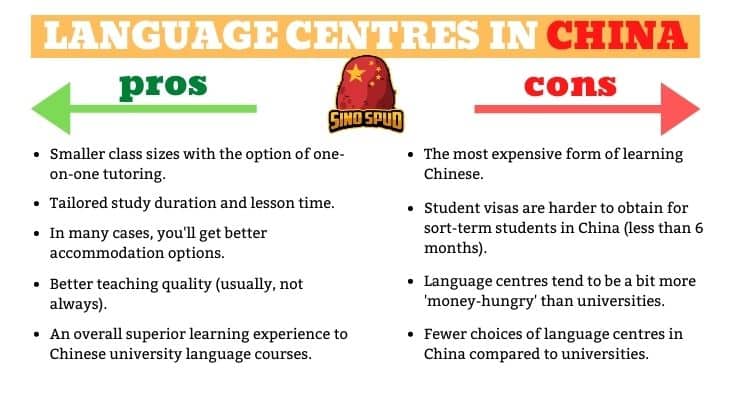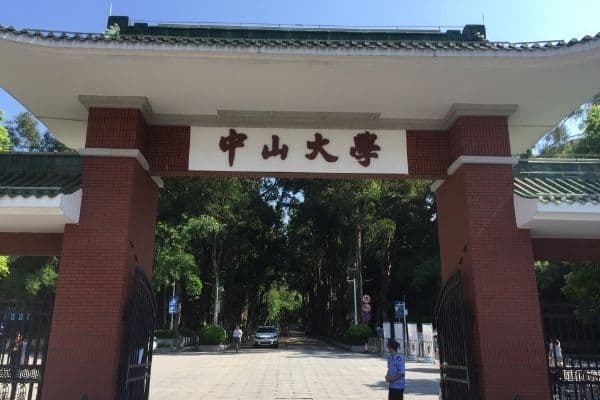
If you want to take your Mandarin skills to the highest heights, China seems like a fairly sensible place to go to achieve your goals.
You can learn a language from anywhere these days but there are numerous benefits to studying Chinese in China. Those benefits include:
- Easy access to an immersive language experience.
- A high concentration of Mandarin education institutions.
- Unrestricted access to Chinese media – a great source of learning content.
- First-hand knowledge and experience of Chinese culture.
Below you will find everything you need to make an informed decision on whether to come to China to study Mandarin Chinese. This post is quite long, so make use of the hyperlinks if you need to.
Chinese Language Schools | Chinese University Language Courses | Studying Mandarin Independently in China | Chinese Media | The HSK | Moving to China FAQs
Chinese Langage Schools: What to Expect
In every city in China with some sort of foreign presence, you are likely to find a Chinese language centre.
Since Covid-19 came on the scene, there are notably fewer language centres in China but there are definitely some still here.
It goes without saying that the quality of language centre varies, but in most cases, studying in Chinese language centres will provide you with a better overall learning experience than a University language course.

Chinese Language Centres: The Truth
Here are some of my brutally honest and first-hand observations about studying at the top language centres in China.
- They’re overpriced – Studying Mandarin at Chinese language centres is expensive. Even at the cheapest language centre in China, Omeida, (I still thoroughly enjoyed studying there), you’re going to be spending more than 6000 USD if you want intensive study for 6 months. I wouldn’t mind care so much about this price if the teacher kept most of the money (as they should), but they don’t.
- They exaggerate the ‘experience’ – Based off my own involvement and after speaking to former students of many of these language centres, the learning experience is rarely as good as promised. I’m referring to group outings, canteen food, cultural excursions, and the general atmosphere of the school. The marketing managers of these schools can be pretty effective at over-selling.
- Your teacher might suck – I feel this has a lot to do with a difference in learning cultures, but don’t expect fireworks in the classroom. A dynamic and experimental learning environment just isn’t something you’ll find here. Expect working out of a textbook just like you would at a school in China. Obviously, this stuff can depend on your teacher, but don’t expect miracles at a language centre just because you’re paying more than a university language course.
- If you don’t make progress, it’s your fault – This is 100% true. Now, obviously if you’re in a classroom learning Mandarin all day you’re going to make progress. However (and a lot of people don’t like hearing this), it’s what you do outside of the classroom that counts. Always. Reading, listening, conversing, and generally bombarding yourself with immersion is the only way to make as much progress you can in the quickest possible time.
7 of the Best Chinese Language Schools in China
The following language schools are considered the tip-top ones in China, and the only ones I’d consider applying to. They’re also some of the only language schools still left in China, as most of the smaller Chinese language schools have disappeared due to Covid-19.
Hutong School

Hutong School has been around for over a decade and they have centres in Shanghai, Beijing, Hangzhou, Chengdu, Chongqing, and Zhengzhou. They offer a range of long and short-term study programs. They’re also an HSK-certified test centre, so you can sit the HSK test there if you wish.
Program highlights
- Maximum 4-8 students in each class.
- 1-on-1 classes.
- 2 weeks to one year study program.
- Intensive programs available with 4 class hours a day.
- Optional accommodation.
- All campuses in downtown central locations.
Cost: 900 USD for 2 Weeks intensive program (4 hours per day) without accommodation.
LTL Mandarin School

LTL Language School is also a chain, with centres in Shanghai, Beijing, Xi’an, Chengdu, Beihai, and an immersion course in the small north-eastern town of Chengde. They also have schools in Taipei and Singapore.
One of the cool things about LTL is that two of the campuses (Beihai, and especially Chengde) are further off the beaten track and a great opportunity for a more immersive experience away from big groups of foreigners.
Program Highlights
- 1-on-1 or small group classes.
- 2 weeks to one year study programs.
- Super intensive schedule with 6 hours of lessons a day.
- Flexi-schedule available.
- Optional accommodation and homestay.
- Chengde immersion program available.
COST: 2200 USD for two weeks 1-on-1 for 6 hours a day without accommodation
Omeida Chinese Academy

A language academy in the absolutely gorgeous setting of Yangshuo and one of the most popular destinations among foreigners travelling to China.
I studied Mandarin at Omeida on the standard course for 6 months and I had a fantastic time. The environment of the school is great and all of the staff are super friendly. Omeida is more wallet-friendly than the other schools on this list, but you will most likely be doing fewer class hours as part of your course. The standard course at Omeida is 3 x 45-minute periods a day.
Program Highlights
- 1-on-1 or small group classes.
- Beautiful school environment. Yangshuo really is stunning.
- More relaxed schedule with the option of intensive studies.
- Flexi schdule available.
- Wider range of accommodation options.
- A vibrant student community (English school next door meaning opportunities for a language partner).
COST: 1180 USD for two weeks intensive group program (6 class hours per day) without accommodation.
Chinese Language Institute

CLI isn’t too far from Omeida Language Academy. It’s also located in Guangxi province, a little further up the road in the city of Guilin. As far as Chinese cities go, Guilin isn’t too big, but it’s pretty nice looking.
CLI is a very professional outfit and I know a number of students who have studied at both CLI and Omeida in Yangshuo. Usually, they’ll tell me that they have a better time studying at Omeida, but the course quality of CLI is superior.
- 1-on-1 or small group classes.
- Good location in the centre of Guilin.
- Popular homestay option.
- Flexi schdule available.
- Very professional teaching team.
COST: 1240 USD for two weeks intensive (4 class hours per day) 1-on-1 classes with private accommodation.
Keats Education

Keats School headquarters are located in the city of Kunming. However, if you wish to learn 1-on-1 at Keats you can do so in many other picturesque locations in the surrounding Yunnan province. Kunming itself isn’t exactly the nicest of cities, but it’s in a good location if you want to explore the rest of Yunnan province (and you should).
A good friend of mine studied at Keats and said it was a very professional outfit and the teachers were excellent. The downsides were that the student community wasn’t as thriving as elsewhere, but this was largely thanks to Covid-19.
Program Highlights
- 1-on-1 or small group classes.
- Popular homestay option.
- Flexi schdule available.
- Volunteer and study program for discounts.
- Very professional teaching team.
- Good location for exploring Yunnan province.
COST: 1750 USD for two weeks intensive (6 class hours per day) 1-on-1 classes with no accommodation.
Beijing International Chinese College

Not as well marketed as the other schools on this list but BICC offers a strong range of services and learning programs.
There are 3 campuses in Beijing, but take note that the accommodation provided (other than homestay) is next to the Maquanying campus, which is over an hour away from the main campus in Sanlitun.
There are a few scholarships for those wanting to study at BICC for certain purposes.
Program Highlights
- 1-on-1 or small group classes.
- Homestay or accommodation provided by the school.
- Scholarships available.
- 3 different study campuses in Beijing.
- Flexible study schedule available.
COST: 810 USD for two weeks intensive (20 hours group classes, 10 hours 1-on-1 per week) with no accommodation.
Chinese University Language Courses

After living in China for a couple of years, a friend and former colleague of mine was the envy of every foreigner at our school because of his impressive Chinese language skills.
After asking how his Chinese became so good, he told me he spent a year studying Chinese at Jinan University in Guangzhou. Every weekday morning he spent four hours with a Chinese teacher and a group of other foreigners learning to read, write, listen and speak Mandarin.
I decided to do a bit of research on the topic, and with much enthusiasm, I applied to a Mandarin language course at Sun Yat-Sen University in Guangzhou.

University Language Courses: The Truth
Course reputation – based upon my own experiences and those of other foreigners in China, it seems there isn’t much of a difference between the quality of language courses at different universities. Try to remember that a Chinese university language course is NOT a degree course. No employer is ever going to care which university you did your university language course at.
Class sizes – Expect quite a lot of students in your class. At least, there’ll be many more students in your class compared to a group class at a private language school. My classes at Sun Yat-Sen University had around 25 students. Some classes had fewer students, some had more.
Course content – You’ll be following a set of textbooks quite closely, so don’t expect a lot of dynamism in your lessons. As mentioned above, the structure of your lessons at a university will be quite rigid, so get used to sitting in your seat, listening to loads of audio recordings, and writing dictation.
Attendance and grades – These days, if your grades are poor and you don’t attend class, you will face problems. There’s always a chance you’ll get kicked out of the university and your student visa will be cancelled. I saw this happen to people on my course who didn’t show up to class. Back in the day, the Chinese authorities were much more relaxed on this issue.
Best University Courses
As mentioned earlier, ranking university language courses in China is somewhat of a pointless exercise. University language courses are very similar at each university, and the whole ‘university league table’ thing only really comes into play for undergraduate or master’s degree courses.
Nevertheless, one will make a shortlist of universities that might be good places to study Mandarin based on a few different factors.
Despite the fact I studied there, I shan’t be including Sun Yat-Sen University on this list because the university’s Mandarin Chinese language course has been discontinued.
- Tsinghua University, Beijing – If you’re really obsessed with the idea of university prestige, you can head to the highest ranking university in China at the heart of the nation’s capital to study Mandarin.
- Beijing Language and Culture University – Probably the most popular university language course for foreigners in China. I’ve met a lot of students who’ve studied here and most of them were quite complimentary about their course.
- Shanghai Jiao Tong University, Shanghai – Very well respected, excellent location, and a lot of foreigners have been through the doors of this place to learn Mandarin.
- Shenzhen University – Not the most highly regarded university in China, but it’s at the heart of a very dynamic tier 1 city with a lot of opportunities. There’s also a very high number of Chinese migrants to this city, meaning Mandarin is more widely used here compared to Guangzhou.
- Harbin Institute of Technology – Personal opinion, but Dongbei people are the coolest in China. They seem to be more open, confident, and they enjoy a good party. Their Mandarin accent is clear, with the added cool factor soundling like a pirate (lots of ‘r’s). Harbin is in the nothernmost province of Heilongjiang, so be warned that the winters are cold there.
- Yanshan University – The city of Chengde was the imperial summer capital in the Qing dynasty and people here are famous for speaking the best and most standard Mandarin of all in China. There isn’t a university in Chengde with a Mandarin language course, but the closest thing is Yanshan University in the city of Qinhuangdao. It’s by the beach, too!
How to Choose a Good Mandarin University Course
There are literally hundreds of universities for you to choose from in China, so making a decision can be tough. I would suggest keeping the following three things in mind when doing your research:
- Costs – Some cities are cheaper than others. Much cheaper. You’re going to be spending a lot more money to live in Shanghai than Xining.
- Course quality – It’s impossible to gauge course quality from institution to institution. Nevertheless, I would take a punt and say the Mandarin courses at the famous Peking University will probably be better than than those at Hunan University of Chinese Medicine.
- Location and dialects – Despite Mandarin being spoken throughout all of China, you’re going to hear it less among locals in certain parts of the country. If you’re unsure as to where, check out this map.
- Location and climate – If you hate cold weather, then a winter in Dongbei will be bloody awful. If you hate being hot and sweaty, a summer in Shenzhen will be miserable. Consider the varying microclimates of China and what kind of weather you prefer.
CUCAS
If you’re planning on studying a Chinese language course, a good jumping-off point is a website called CUCAS.
CUCAS offers a database of university courses in China open to foreigners – not just Chinese language courses. CUCAS also provides details for all of the courses, such as the fees, dates, and accommodation options available at the university in question. You can also use CUCAS services to apply to your university course of choice.
I found that a lot of Chinese university websites look like they were made in the 90s and haven’t been updated since. CUCAS does charge application fees if you apply to universities through the site, but you can always use CUCAS just for research purposes, and then apply through the university’s website instead.
TIP! Always check Reddit to see if someone has also attended the university you wish to go to. It was a good source of information for me when going to Sun Yat-Sen University.
Self-Studying Mandarin in China
Despite the benefits of learning Mandarin in China, the raw truth is that if you really want to learn the language, you’ll do it anywhere.
Sure, I made progress in the language and really enjoyed my experiences studying at university and language schools in China, but the most progress I’ve made with the language has come through self-studying.
The following is a list of helpful articles on how to beging self-studying and how to do so effectively:
- How To Learn Mandarin From Scratch (From a Guy Who’s Done It)
- Can I Learn a Language Completely by Myself?
- The 21 Best Apps For Learning Mandarin Chinese
- The 24 Best Mandarin Chinese Study Resources for Beginners
- Learning Chinese: 15+ Listening Tools Perfect for Beginners
- Learning Chinese: The Best Textbooks For Beginners
- Learn Chinese for FREE | Free Apps, Sites, Courses, and Media
- Can you Learn Chinese by Studying Only 5 Minutes a Day?
- Simplified and Traditional Chinese Characters | Which Should I Learn?
- What are Radicals and Components in Chinese Characters?
Chinese Media
When it comes to media, I feel that learners of Chinese are at a slight disadvantage compared to English learners. The amount of TV shows, movies, music, and other forms of art created in the English-speaking world is absolutely stupendous.
Don’t get me wrong, there is obviously a large amount of Mandarin media available in China. However, if you like a range of genres and/or you’re a music, TV, or movie snob, you might find access to life-changing media in China quite limiting.
Basically, I hope you enjoy dynastic dramas, talent shows, and insanely over-the-top romantic themes thrust into everything, because that’s what the entertainment business here is based on.
Nevertheless, if you look hard, you are likely to find something you can tolerate. If you don’t want to spend an inordinate amount of time searching, then don’t worry – I’ve done the hard work for you!
- Learn Mandarin with Film | 101 Awesome Chinese and Taiwanese Movies
- 100+ Podcasts for Learning Chinese | Beginner to Advanced Material
- 101 TV Shows for Chinese Learners | Drama, Action, Comedy, and More!
- 89 Awesome Chinese Books for Learners of Mandarin Chinese
Chinese Music
The only resource you really need for listening to Chinese music in China is QQ Music (QQ 音乐), but KuGou (酷狗) has a lot of Chinese users, too.

It’s very easy to navigate once you get used to it. QQ Music also has some benefits that Spotify doesn’t have:
- It’s free and you don’t have to listen to annoying ads.
- Once you’ve listened to a song once that song can be listened to again on airplane mode so it doesn’t eat your data.
- Almost every song is translated into Chinese in the lyrics section – even Bruce Springsteen classics!
Here are some musical Chinese terms to help you navigate QQ Music:
音乐 – music | 语言 – language | 首页 – homepage | 华语 – Chinese language |
国语 – Chinese (Mandarin) | 乐库 – Music library | 排行榜 – Top charts |
歌手 – singer | 专辑 – album | 歌词 – lyrics
Finding the kind of Chinese music you like can be tough. To get you started, there are quite a few helpful Reddit threads mentioning Chinese music perhaps more palatable to western ears:
- Chinese Music
- Chinese Music
- Chinese Music Subreddit Collection
- Chinese Indie/Rock Music
- Classic Chinese Karaoke Songs
- Taiwanese Music (often where the good stuff comes from)
Online Teachers and Language Partners
One might think it sounds a bit crazy to have an online Chinese teacher whilst living in China, but there are a couple of reasons you might want to consider this.
- Online teachers are convenient and often cheaper than in-person teachers.
- There are also loads more teachers to choose from online.
Language partners are a much talked about option for Mandarin learners in China. A language partner is someone you can practice your target language with (Mandarin in this case) whilst they practice their target language with you.
Check out the post Where Can I Find Good Chinese Teachers Online? Here I’ve gone into more detail about online teachers and language partners.
The HSK (Chinese Proficiency Test)
The HSK test is the standardized test of standard Chinese language proficiency test for non-native speakers.
TIP! Starting in 2022, there are some fairly big changes coming to the HSK exams. For a full guide on what to expect, check out the guide below.
There is also a spoken HSK exam, the HSKK, and this is divided into beginner, intermediate and advanced level. You can buy the official HSK textbooks online with Taobao and Amazon, and you can look at some past papers here.
For more information on the HSK, check out The Ultimate Super-Mega-Whopping Guide to the HSK 3.0.
Learning Mandarin in China FAQs
Moving to China is a bold move for anyone, so you’ll naturally have reservations. Here I’ll answer some of those most common questions people ask me about coming here specifically to study Mandarin.
Is studying at home more effective?
There are some pretty awesome resources out there on the market for independent learners these days. I’d say there’s enough content on the internet now to become completely fluent in Mandarin without leaving your room. You’d save a lot of money if you learned this way, too.
If you don’t study independently, you won’t progress with the language as fast as you could. Also, if you can’t motivate yourself to study independently, it’s a sure sign you don’t really want to study Mandarin at all.
If you don’t study Mandarin independently, you won’t become fluent. It’s that simple.
Studying Mandarin in China has not only helped with the language by introducing me to a lot of Chinese people and learning about modern Chinese culture, but it’s also taught me how to be a better self-learner.
I didn’t have to learn Mandarin in China to get to where I am, but I’m glad I did.
Ultimately, only you can decide if it’s worth it.
Do accents and dialects make things more difficult?
Yes, as is the case with any language you’re learning.
In most areas of China, the local dialect differs quite a lot from standard Mandarin, to the point where it becomes an unintelligible language to people who aren’t from the area.
Nevertheless, Mandarin is spoken by the vast majority of the population, and this is growing each year. Mandarin is the official language of instruction in all schools across the country. Meeting a Chinese person in China who doesn’t even spesk Mandarin as a second language is incredibly rare.
Do they speak Mandarin everywhere in China?
Yes.
I live in Guangzhou, Guangdong province – the birthplace of Cantonese.
Although Cantonese is the language most locals use with each other, the vast majority of people still speak Mandarin. After living in Guangdong for over 7 years, I only met one man who couldn’t speak Mandarin, and he was rather old.
Every school throughout mainland China now uses Mandarin as their language of instruction. If Mandarin is not a Chinese person’s first language, it’s definitely their second.
Also, bear in mind that Chinese people from all over the mainland have migrated to larger cities and they need a common tongue to communicate. The further out into the provinces you travel to, the likelier you are to find under-privileged or older people who can’t speak Mandarin.
Do I have to study in Mainland China? How about Taiwan and Singapore?
There are lots of options for studying in both of these places, just be aware that the prices tend to be much higher. If you’re looking for suggestions for learning institutions, check out the following posts:

